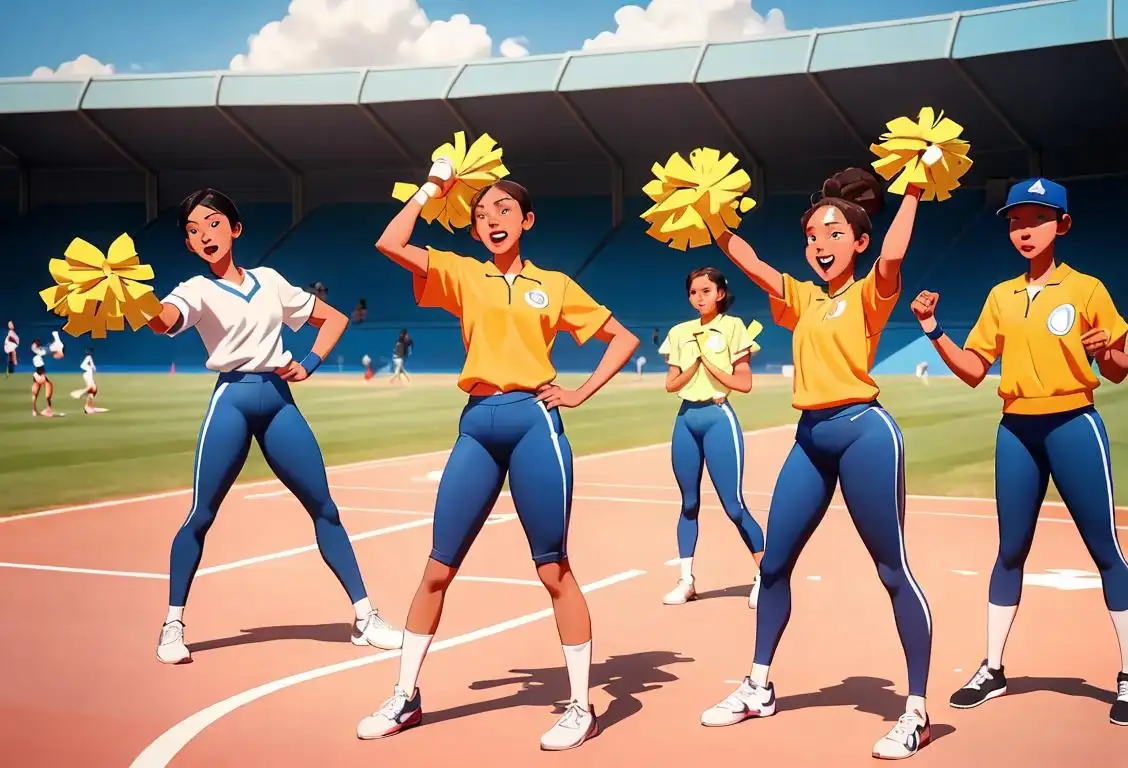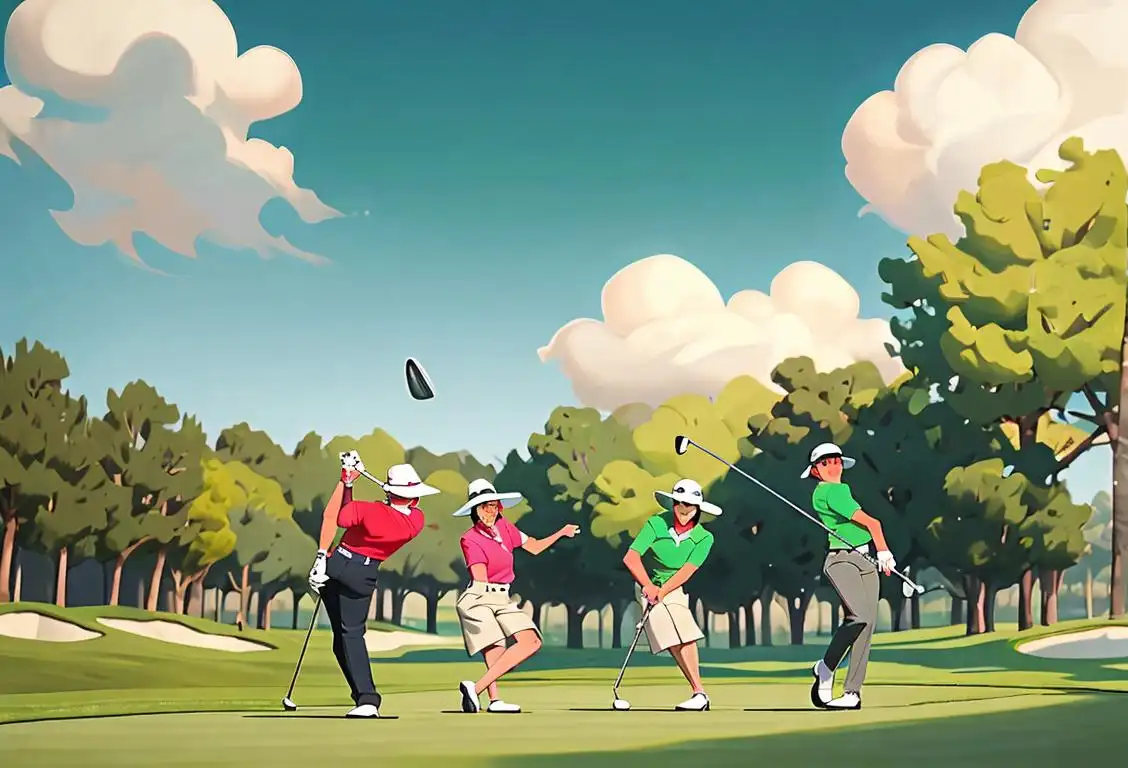National Athletes Day

Are you ready to celebrate the day dedicated to our incredible athletes? Grab your pom-poms and put on your game face because it's National Athletes Day! This special day is all about showing love and support to those who dedicate their lives to sports and physical fitness. So, whether you're a fan of football, gymnastics, or underwater basket weaving, let's jump right into this article and explore the fascinating world of national athletes!
When is Athletes Day?
It's national athletes day on the 28th August.
What is National Athletes Day?
National Athletes Day is an annual celebration that highlights the achievements and contributions of athletes from various sports disciplines. It's a day to honor their dedication, hard work, and the countless hours they spend training to excel in their chosen field.
From professional athletes who compete on the world stage to weekend warriors who participate in local competitions, National Athletes Day recognizes the importance of sports in our lives. It's a time to appreciate the physical prowess, mental toughness, and unwavering determination exhibited by athletes across the globe.
The Origin of National Athletes Day
The exact origins of National Athletes Day are a bit hazy, much like the way our vision becomes when trying to keep up with these super-speedy athletes. While we don't have a specific date or person to credit for the creation of this day, what we do know is that it gained popularity on the internet around August 28, 2015. That's when people started sharing their admiration for athletes and using the hashtag #NationalAthletesDay on social media.
Since then, the day has become an annual tradition, with sports enthusiasts and supporters worldwide joining in the festivities. Whether it's organizing sports events, cheering for their favorite teams, or simply expressing gratitude to athletes in their lives, people find creative ways to celebrate National Athletes Day.
How to Celebrate National Athletes Day
Celebrating National Athletes Day is as versatile as the athletes themselves. Here are a few fun ideas to get you started:
- Organize a sports tournament or friendly competition with your friends, family, or coworkers. It can be anything from a game of soccer to a mini golf championship - the choice is yours!
- Visit a local sports event or watch one on TV. Whether it's a professional game or an amateur contest, immerse yourself in the thrilling world of sports and witness the incredible feats of athletes firsthand.
- Show your support by wearing the jersey or merchandise of your favorite athlete or sports team. Let everyone know who you're rooting for!
- Take part in a charity run or walk to raise funds for a sports-related cause. It's a great way to combine exercise, philanthropy, and celebration all in one.
Did You Know?
Did you know that the world's oldest marathon runner is Fauja Singh? Born in India in 1911, Fauja Singh began participating in marathons at the ripe age of 89! He completed the Toronto Waterfront Marathon in 2003, becoming an inspiration to athletes and non-athletes alike. Age is just a number, my friends!
History behind the term 'Athletes'
776 BCE
Ancient Origins
In ancient Greece, the term 'athlete' found its roots in the Olympic Games held in 776 BCE. These games were a significant part of Greek culture and celebrated physical prowess and competitive spirit. The word 'athlete' comes from the Greek word 'athlētēs' which means 'one who competes for a prize'. Initially, the term was used to describe individuals who participated in various sporting events, including running, wrestling, chariot racing, and discus throwing.
776 BC
Origin in Ancient Greece
The term 'athletes' finds its roots in Ancient Greece, where athletic competitions were an integral part of the culture. The first recorded use of the term dates back to the year 776 BC, during the inaugural ancient Olympic Games held in Olympia. These early athletes competed in various events, including running, long jump, and discus throw, showcasing their physical prowess and skills.
Ancient Greece (776 BCE)
Ancient Origins
The term 'athletes' originated in Ancient Greece during the first Olympic Games in 776 BCE. The Greek word for athlete is 'athlētḗs', which derives from the verb 'athlein' meaning 'to contend for a prize'. In this context, athletes referred to individuals who participated in various competitive sports and physical activities, showcasing their skills and strength.
776 BC
Ancient Olympic Games Begin
The term 'athletes' originates from the ancient Olympic Games held in ancient Greece. The Games were officially inaugurated in 776 BC and were dedicated to the Greek god Zeus. The participants of these Games were called 'athletes' as they competed in various sporting events.
449 BC
Athletics in the Panhellenic Games
In 449 BC, the Panhellenic Games were established, further emphasizing the prominence of athletes in Greek society. These games, which included the Olympics, Pythian Games, Nemean Games, and Isthmian Games, united athletes from different city-states and acted as a platform to demonstrate strength, agility, and athleticism. The competitions became a symbol of Greek unity and heralded the golden age of athletes.
Ancient Rome (1st century BCE)
Spread and Professionalization
During the 1st century BCE in Ancient Rome, the concept of athletes expanded beyond mere participation. Athletes started training intensively and dedicated their lives to physical excellence. They gained popularity by entertaining the masses with displays of strength, agility, and stamina. These athletes began receiving patronage from wealthy individuals and emperors, transforming athleticism into a profession.
5th Century BCE
The Importance of Gymnasiums
During the 5th century BCE, gymnasiums started to play a vital role in Greek society. These establishments not only provided facilities for physical exercise but also served as centers for education and philosophical discussions. Young men, known as 'athletes', would train extensively in these gymnasiums to prepare for upcoming athletic competitions. The rigorous training helped shape their bodies while instilling discipline and promoting camaraderie among fellow athletes.
5th Century BC
Origin of the Term 'Athlon'
The Greek word 'athlon' emerged in the 5th century BC, which later evolved to become the root of the term 'athletes.' 'Athlon' referred to a prize or a contest. It was associated with physical prowess, and those who participated in athletic contests were termed 'athletes.'
19th Century (1800s)
Formation of Modern Sports
The 19th century witnessed the birth of organized sports and the formation of sports clubs and associations. This period marked the transition of athletes from performing in isolated events to participating in structured competitions. Sports such as football, baseball, and athletics gained immense popularity, giving rise to a new generation of athletes who trained rigorously and competed at national and international levels.
776-393 AD
Ancient Olympic Games Discontinued
For over a millennium, the ancient Olympic Games continued to be a significant event in Greek culture. However, they were eventually abolished in 393 AD by the Roman Emperor Theodosius I. The term 'athletes' became less prevalent in the following centuries as the Games ceased to exist.
4th Century BC
Training and Gymnasiums
During the 4th century BC, training for athletes became more structured, leading to the establishment of dedicated gymnasiums. These facilities provided a space for athletes to hone their skills and improve their physical fitness. Athletes participated in rigorous training regimens, which included exercises, wrestling, and other athletic disciplines, transforming their bodies and abilities.
1896 CE
Modern Olympic Games
The revival of the Olympic Games in 1896 by Pierre de Coubertin marked a significant milestone for the term 'athletes'. With the reestablishment of the modern Olympic Games in Athens, the title of 'athlete' regained its prominence. The event showcased exceptional athletes from around the globe, competing in various sports such as track and field, swimming, gymnastics, and more. This reintroduction of the games inspired a new generation of athletes and solidified the term's association with sportsmanship and excellence.
20th Century (1900s)
Olympic Revival and Professionalism
In the early 20th century, the Olympic Games were revived, reigniting the global interest in athleticism. Athletes from different countries showcased their skills and competed on an international scale, bringing recognition to their respective nations. Additionally, the emergence of professional sports leagues led to the rise of athletes who earned their livelihood through sports, making it a full-time career.
20th Century
Professionalization of Sports
Throughout the 20th century, professional sports became increasingly popular, leading to the emergence of professional 'athletes'. Athletes started to earn a living through their sporting abilities, transcending the amateur status of the past. This shift not only changed the way athletes were perceived but also impacted the marketing, sponsorship, and financial aspects of sports, turning athletes into prominent figures with substantial influence on popular culture.
19th Century
Revival of the Olympic Games
The term 'athletes' experienced a resurgence in the 19th century with the revival of the Olympic Games. Influenced by the ancient Games, Pierre de Coubertin spearheaded the efforts to revive the Olympics, leading to the establishment of the modern Olympic Games in 1896. 'Athletes' once again became a widely used term to describe the participants of these global sporting events.
11th Century
Feudal System and Knightly Activities
In the 11th century, the term 'athletes' took on a broader meaning as it encompassed individuals engaged in knightly activities and chivalric tournaments. Knights and warriors were considered the athletes of their time, displaying bravery, equestrian skills, and combat prowess. These feudal athletes participated in jousts, tournaments, and other martial contests, showcasing their physical abilities and prowess.
Present Day
Global Recognition
The term 'athlete' has become universally recognized and is no longer confined to the realm of Olympic sports. Today, athletes participate in an extensive range of competitive activities, including team sports, extreme sports, and individual disciplines. They inspire millions through their dedication, skill, and perseverance. Moreover, athletes have a profound impact on society and serve as role models for aspiring individuals across the world, showcasing the power of human potential and the pursuit of greatness.
18th Century
Modern Sporting Competitions Emerge
In the 18th century, the concept of modern sporting competitions began to evolve. Public interest in sports grew, and organized events, such as track and field meets, started to gain popularity. 'Athletes' regained its association with individuals participating in these organized athletic competitions, highlighting their commitment to physical excellence and competitive spirit.
20th Century
Expansion of Competitive Sports
Throughout the 20th century, competitive sports expanded rapidly, leading to a significant increase in the number of individuals participating in athletic events. This growth further solidified the term 'athletes' as it became commonly used to describe individuals dedicated to physical training and competing in various sports disciplines.
Present Day
Diverse Forms and World-class Athletes
In the present day, the term 'athletes' encompasses a wide range of individuals participating in diverse sports and physical activities. From traditional sports like track and field to modern sports like esports, athletes have become global icons and role models. World-class athletes captivate audiences with their exceptional skills, pushing the boundaries of human potential and inspiring others to pursue their passion for sports.
Present
Athletes in Contemporary Culture
In present times, the term 'athletes' encompasses a wide range of individuals who engage in sports professionally, as well as those who pursue sports as a passion or for recreational purposes. Athletes are admired for their physical abilities, dedication, and sportsmanship, and they play a significant role in shaping contemporary sporting culture worldwide.
1896
Inclusion in the Modern Olympic Games
The year 1896 marked the revival of the Olympic Games in its modern form. The term 'athletes' once again took center stage as the participants in this prestigious international event. The modern Olympic Games symbolized the pinnacle of athleticism, uniting athletes from all over the world in the spirit of friendly competition and cultural exchange.
20th Century
Professionalism and Global Sporting Icons
Throughout the 20th century, athletics evolved into a professionalized field, with athletes becoming global icons. The rise of sports like football, basketball, and athletics captured worldwide attention, and exceptional athletes gained fame and fortune. The term 'athletes' became synonymous with individuals who not only excelled in their respective sports but also represented the pinnacle of human physical ability.
Did you know?
Did you know that the world's oldest marathon runner is Fauja Singh?Tagged
awareness fun sportsFirst identified
27th August 2015Most mentioned on
28th August 2015Total mentions
35Other days
Wing Day
Left Handers Day
Golf Day
Fitness Day
Foundation Day
Cancer Survivors Day
Dance Day
Memorial Day
Gymnastics Day
Student Athlete Day









